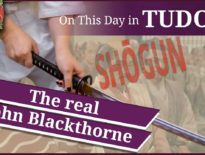On this day in Tudor history, 17th May 1601, Anthony Bacon was buried in St Olave's, London.
You might have heard of Francis Bacon, but his brother, Anthony Bacon, was rather interesting too!
Who was Anthony Bacon?
Well, he was a spy, providing intelligence for the likes of William Cecil, Sir Francis Walsingham, Elizabeth I and Robert Devereux, Earl of Essex. Find out more in today's talk:
Also on this day in Tudor history, 17th May 1521, Edward Stafford, 3rd Duke of Buckingham, was executed for treason on Tower Hill. He'd served King Henry VII and King Henry VIII loyally for many years, so what led to this nobleman being condemned for high treason? Find out in last year’s video:
And on this day in 1536, George Boleyn, Sir Henry Norris, Sir Francis Weston, William Brereton and Mark Smeaton were executed on Tower Hill for high treason after being found guilty of adultery with Queen Anne Boleyn and conspiring with her to kill King Henry VIII.
Find out more about their tragic ends in the video for 17 May 1536:
Also on this day in history:
- 1575 – Death of Matthew Parker, Archbishop of Canterbury, at Lambeth Palace. Parker had also served Queen Anne Boleyn as chaplain, and was known for his patronage of scholars.
- 1581 – Death of Sir William Cordell, lawyer and Speaker of the House of Commons, at The Rolls in Chancery Lane. He was buried in Long Melford church.
- 1610 – Death of Gervase Babington, theologian and Bishop of Worcester. He was buried in Worcester Cathedral.
Transcript:
On this day in Tudor history, 17th May 1601, Anthony Bacon was buried in St Olave's, London.
Who was Anthony Bacon? Well, he was a spy, providing intelligence for the likes of William Cecil, Sir Francis Walsingham and Robert Devereux. Let me tell you more…
• Anthony Bacon was born in 1558 in Hertfordshire, and was the son of Sir Nicholas Bacon, Queen Elizabeth I’s Lord Keeper of the Great Seal, and his second wife, Anne Cooke, daughter of the renowned Tudor humanist, Sir Anthony Cooke.
• Through his maternal aunts’ marriages, Anthony was related to important men like Sir Henry Killigrew, Sir Thomas Hoby, and William Cecil, Lord Burghley. His younger brother was Francis Bacon, the famous philosopher and statesman.
• After an early life spent at home in York House on the Strand, Anthony was educated at Trinity College, Cambridge, under John Whitgift, later Archbishop of Canterbury, but repeated illness meant that Anthony did not graduate.
• In 1576, he was admitted to Gray’s Inn, one of London’s inns of the court, and in 1579, he travelled to Paris, where he began his spy career, gathering intelligence for Burghley and Walsingham.
• From Paris, he moved to Bourges and then Geneva, arriving there in 1581. He lodged in Geneva with French Reformed Protestant theologian, Theodore Beza. He also travelled to Lyons, Montpellier, Toulouse, Marseilles, and Bordeaux, where he worked on behalf of Robert Devereux, 2nd Earl of Essex, and Queen Elizabeth I. He was often ill, probably with malaria. He then moved to Béarn, where he spent time with the theologian Lambert Daneau.
• While he was in France, he became known for his links with Huguenots and Elizabeth I used him as a go-between with Huguenot leader Henri of Navarre, the future King Henry IV. Henri’s court was based at Montauban, so Bacon moved there. While there, in 1586, Bacon and one of his pages were accused of sodomy, but Bacon survived the charges unscathed, probably because of the intervention of Henri of Navarre.
• In 1590, his mother, Lady Bacon, disowned him after he became friends with Anthony Standen, an imprisoned Catholic double agent, while in Bordeaux.
• Bacon returned to England in 1592 but by that time things were strained between him and his former patron Lord Burghley. However, his brother, Francis, was able to recommend him to the Earl of Essex, for whom he acted as secretary and went on to co-ordinate a network of spies across Europe.
• In 1593, he was elected as a Member of Parliament for Wallingford in Berkshire.
• Constant health problems, such as gall stones and gout, prevented him from travelling to the royal court, and in his final years he was housebound.
• Although Bacon was close to Essex and lived at Essex House between 1596 and 1600, he escaped involvement in Essex’s failed rebellion in 1601.
• Bacon died in London, in 1601. His date of death is unknown, but he was buried on this day, 17th May 1601 in St Olave’s, Hart Street, London. His estate went to his brother Francis, but he’d died badly in debt.
• Although Bacon is overshadowed by his more famous brother, Francis, his biographer, Alan Stewart, notes that he “was undeniably a highly capable intelligence gatherer, a literate, experienced, and informed man, with a formidable archive of useful secrets, whose talents—although divorced from flamboyant court life—were fully recognized by those players engaged in the complex negotiations of English and European politics during the last two decades of the sixteenth century, and whose meticulously kept correspondence provides an unparalleled insight into the period.”
He does sound like he had quite an interesting and eventful life!



Leave a Reply